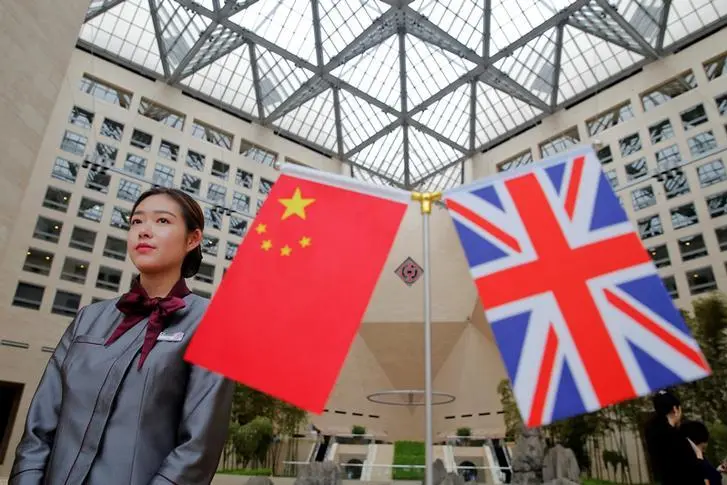PHOTO
(The author is a Reuters Breakingviews columnist. The opinions expressed are his own.)
LONDON - China and Britain are increasingly at loggerheads. Beijing is unhappy with Britain’s decision to offer up to 3 million Hong Kong citizens the right to live and work in the United Kingdom. Meanwhile, Prime Minister Boris Johnson looks increasingly likely to ban equipment made by China’s Huawei Technologies from British 5G mobile networks. The two countries’ collaboration on nuclear power stations could be the next flashpoint.
Just as with telecom equipment, Sino-British nuclear power ties are deeply intertwined. China General Nuclear Power (CGN) holds a 30% equity stake in a company that is building the 20 billion pound Hinkley Point C power station in the west of England. The state-owned Chinese group also has an option to acquire 20% of another planned plant at Sizewell C in Suffolk, and a majority stake in an entity looking into several more. The projects are integral to Britain’s ambition to decarbonise its energy supply by replacing the fifth of electricity provided by ageing, soon-to-be-decommissioned nuclear plants.
The current relationship has mutual benefits. The UK gets zero-carbon energy without upfront cash, plus Chinese expertise on the Hinkley design, a version of which is already operating in the People’s Republic. Successfully delivering British power stations would help Beijing secure other foreign nuclear projects.
Still, the arrangement has its detractors. Britain’s National Audit Office has criticised the government for guaranteeing to pay CGN and state-backed partner Electricite de France $92.50 per megawatt hour – well above the prevailing cost of power – to take on the risk that the plant is late or over budget. Had Britain shared the construction risk with consumers via their bills, the cost of capital could have been half the 8%-plus offered to CGN and EDF. It would be cheaper still if the state had financed the entire project itself.
It’s possible for the two sides to consciously uncouple. Beijing could let its options over future UK power stations lapse, for example. Rethinking the Hinkley project would be much more complicated. Even then, the UK could buy out Beijing’s stake, or promise it a share of the cash flows in return for a less engaged role.
UK power planners, CGN and EDF will prefer to maintain the status quo. But given the rising tensions between Britain and China, the risk of a meltdown is rising.
CONTEXT NEWS
- Boris Johnson is expected to draw up plans to phase out Huawei Technologies from Britain’s 5G phone networks in July, after warnings that U.S. sanctions have undermined the Chinese telecoms equipment maker’s ability to supply the UK market.
- An official security inquiry has raised “very, very serious” questions about whether Huawei can continue with its limited role as a supplier of 5G networks after the United States announced fresh sanctions in May, according to government officials cited by the Financial Times on July 5.
- China said on July 2 that Britain would bear all consequences for any move it took to offer Hong Kong citizens a path to settlement in the United Kingdom.
- China reserved the right to act against Britain over the issue, foreign ministry spokesman Zhao Lijian told a daily briefing, without specifying what countermeasures Beijing might take.
- UK foreign minister Dominic Raab said on July 1 that Britain would offer all those in Hong Kong with British National (Overseas) status a "bespoke" immigration route after declaring that China had broken the terms of a 1984 handover treaty by imposing a new security law.
- Raab said those with BNO status would be granted five years of limited leave in Britain to work or study. After that, they could apply for settled status and after a further 12 months with settled status, they would be able to apply for citizenship. There will be no quotas, he added.
- As of Feb. 24, 2020, there are 349,881 holders of BNO passports and the government estimates there are around 2.9 million BNOs currently in Hong Kong.
(The author is a Reuters Breakingviews columnist. The opinions expressed are his own.)
(Editing by Peter Thal Larsen and Karen Kwok) ((george.hay@thomsonreuters.com; Reuters Messaging: george.hay.thomsonreuters.com@reuters.net))





















